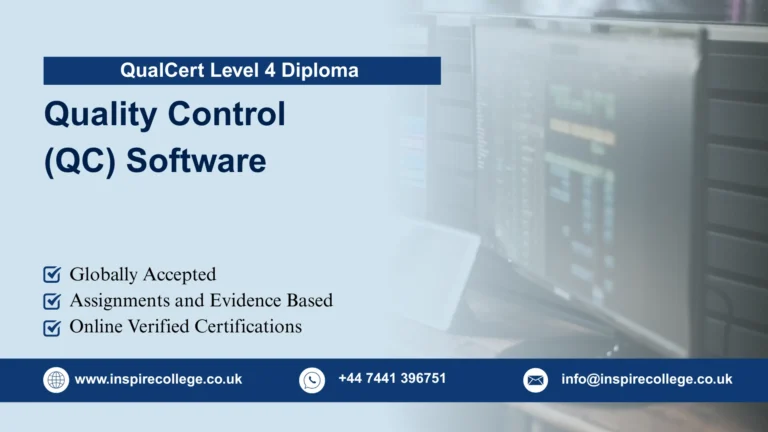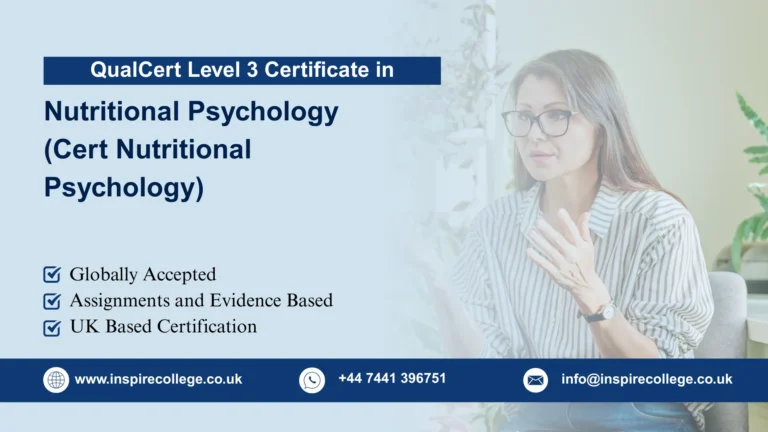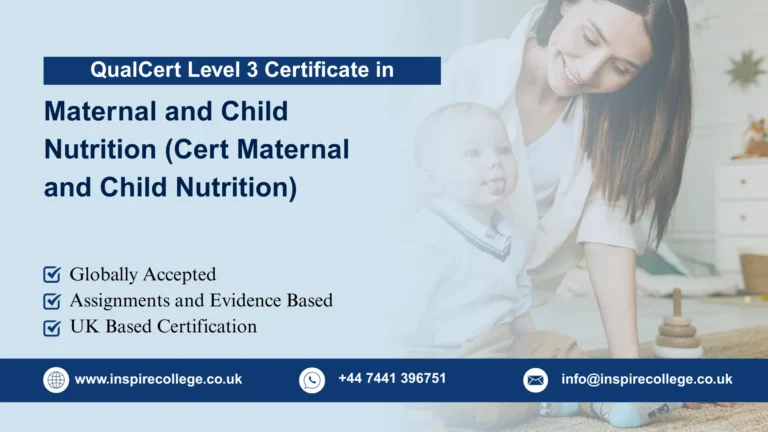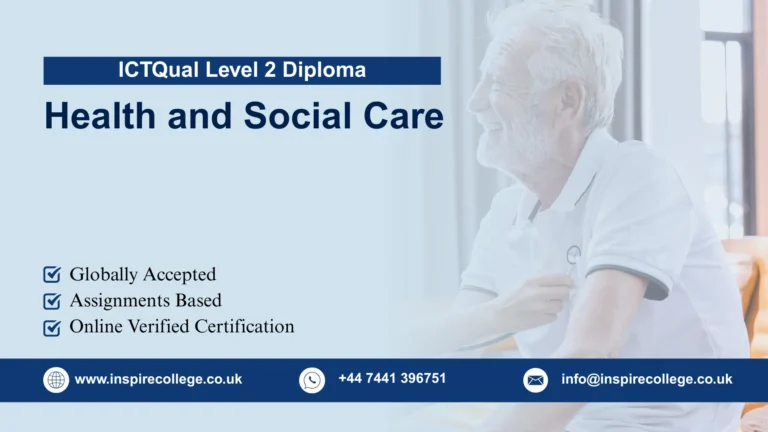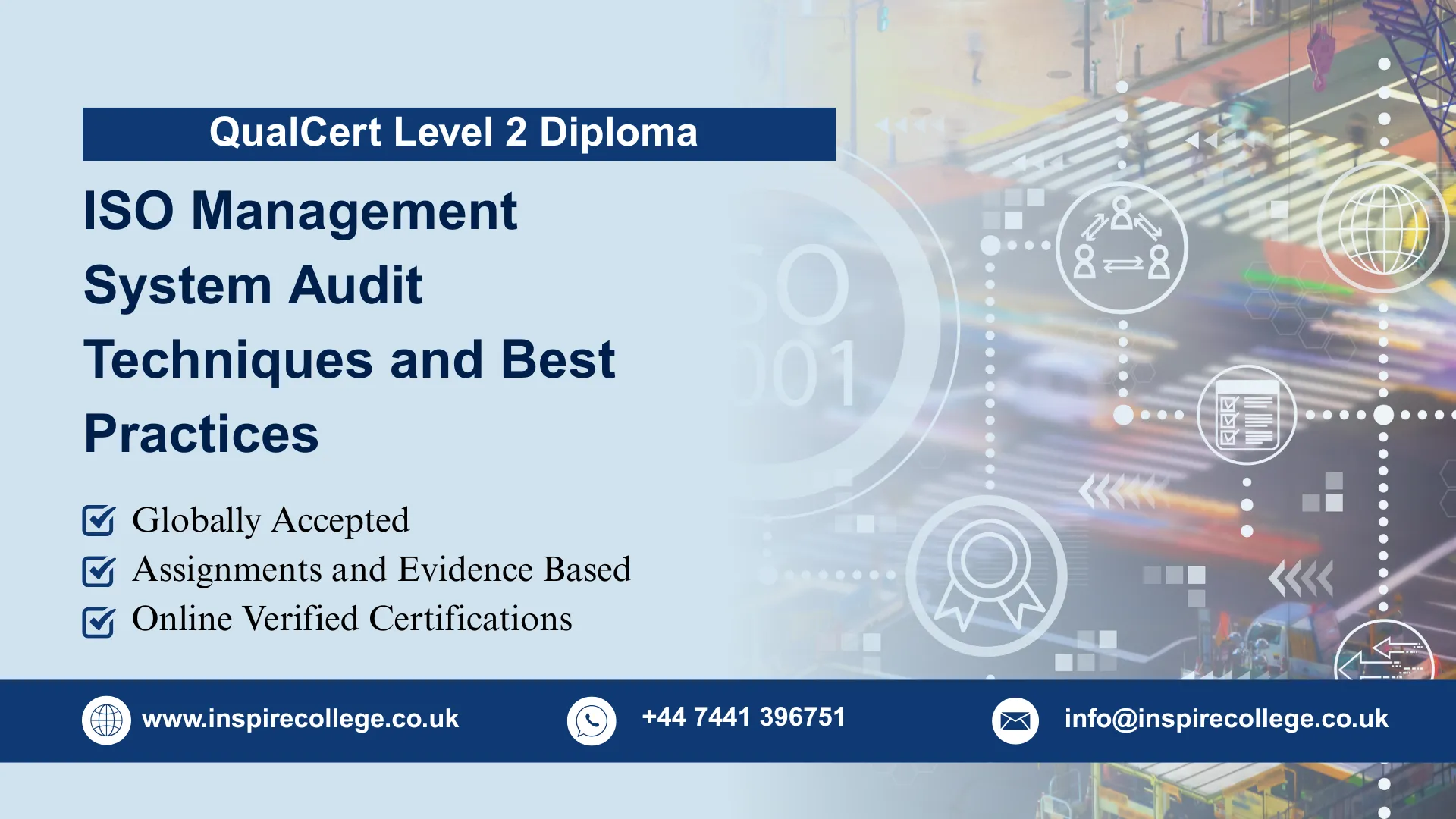
QualCert Level 2 Diploma in ISO Management System Audit Techniques and Best Practices
In today’s highly competitive business environment, maintaining compliance with international standards is critical for organizational success. The QualCert Level 2 Diploma in ISO Management System Audit Techniques and Best Practices is designed to equip professionals with the essential skills and knowledge required to conduct effective internal audits across ISO 9001, ISO 14001, and ISO 45001 management systems. QualCert Level 2 Diploma in ISO Management System Audit Techniques and Best Practices provides a strong foundation in auditing principles, risk assessment, and compliance monitoring, making it highly relevant for quality, environmental, and health & safety professionals.
QualCert Level 2 Diploma in ISO Management System Audit Techniques and Best Practices covers the fundamentals of ISO management systems, including planning and executing audits, documenting findings, and understanding audit procedures in line with international standards. Learners will gain practical insights into developing audit checklists, evaluating processes, and identifying areas for improvement. Emphasis is placed on applying best practices in real-world scenarios, enabling participants to enhance organizational efficiency, ensure regulatory compliance, and contribute to continuous improvement initiatives.
Participants will develop critical skills such as internal audit planning, interviewing and observation techniques, report writing, and corrective action follow-up. QualCert Level 2 Diploma in ISO Management System Audit Techniques and Best Practices also introduces professional ethics and communication strategies essential for auditing roles. By the end of QualCert Level 2 Diploma in ISO Management System Audit Techniques and Best Practices, learners will be capable of supporting organizations in maintaining ISO compliance, mitigating risks, and fostering a culture of accountability and excellence.
Ideal for entry-level auditors, quality and compliance officers, and individuals seeking to pursue a career in ISO management system auditing, this diploma serves as a stepping stone toward more advanced auditing qualifications, including Level 3 and Lead Auditor certifications.
To ensure that candidates can fully engage with the learning process and derive maximum benefit from the QualCert Level 2 Diploma in ISO Management System Audit Techniques and Best Practices, the following entry requirements have been established:
Minimum Age
Candidates must be at least 16 years of age at the time of enrolment. This requirement ensures that participants possess the maturity necessary to comprehend course materials, participate in discussions, and apply audit techniques in practical scenarios.
Educational Background
While it is not mandatory, a Level 1 qualification in ISO Management System Audit Techniques and Best Practices or an equivalent foundational qualification is highly recommended. This provides learners with basic knowledge of auditing principles, ISO standards, and management system concepts. Alternatively, candidates who have relevant work experience in areas such as auditing, quality assurance, compliance, or internal control functions are also well-positioned to benefit from this course.
Language and Literacy Skills
Proficiency in English, both written and spoken, is essential for understanding course content, completing assignments, and engaging in professional communication. Non-native English speakers are advised to have a minimum CEFR Level B1 (or equivalent, such as IELTS 5.5+) to ensure effective comprehension and participation.
Technical Skills
Learners should possess basic computer literacy, including familiarity with word processing software, email communication, and online learning platforms. Access to a computer or mobile device with a reliable internet connection is required to participate in online assignments, discussions, and assessments.
Work Experience (Optional but Advantageous)
Although prior work experience is not a strict requirement, candidates with exposure to quality management, compliance, internal auditing, or risk management environments may find the course particularly relevant. Individuals without prior experience are encouraged to consider completing the Level 1 Diploma as a preparatory step before enrolling in this Level 2 program.
These entry requirements ensure that learners have the necessary academic foundation, language proficiency, and technical skills to succeed in the course and apply ISO audit techniques effectively in professional settings.
Mandatory Units
The QualCert Level 2 Diploma in ISO Management System Audit Techniques and Best Practices offers 42 Credits, requiring a Total Qualification Time (TQT) of 210 hours, including 150 Guided Learning Hours (GLH).
Mandatory Units
The QualCert Level 2 Diploma in ISO Management System Audit Techniques and Best Practices is a comprehensive program designed to equip learners with practical knowledge and skills in auditing ISO management systems.
- Comprehensive Understanding of ISO 9001, ISO 14001, and ISO 45001 Management Systems
Upon completing this course, learners will:
- Explain the fundamental principles, structure, and purpose of ISO 9001 (Quality Management), ISO 14001 (Environmental Management), and ISO 45001 (Occupational Health & Safety) standards.
- Identify and interpret the key requirements, clauses, and documentation expectations within each standard relevant to internal auditing.
- Recognize how adherence to these ISO standards contributes to enhanced organizational performance, compliance, and risk mitigation.
- Understand the interconnections between these standards and apply integrated auditing approaches for more efficient management system assessments.
- Audit Life Cycle and Risk-Based Audit Planning
Learners will be able to:
- Describe the stages of the audit life cycle, including planning, preparation, execution, reporting, and closure.
- Apply risk-based thinking to prioritize audit focus areas according to organizational objectives and potential risks.
- Develop comprehensive, structured audit plans and schedules in alignment with ISO 19011 guidelines.
- Identify methods for assessing organizational significance to allocate audit resources effectively.
- Internal Audit Execution and Documentation Techniques
Participants will:
- Conduct internal audits in accordance with planned scopes, objectives, and criteria.
- Utilize observation, interviews, and document reviews to gather reliable audit evidence.
- Maintain accurate, organized, and professional audit documentation for accountability and traceability.
- Demonstrate adherence to ethical and professional auditing practices during all audit activities.
- Audit Reporting, Follow-Up, and Corrective Action Plans
Learners will:
- Prepare clear, objective, and concise audit reports highlighting findings and observations.
- Distinguish between non-conformities, observations, and opportunities for improvement.
- Develop practical corrective and preventive action (CAPA) plans to address identified gaps.
- Understand the processes for follow-up audits and verification of implemented corrective actions.
- Root Cause Analysis and Preventive Measures in Audits
Upon completion, participants will:
- Apply root cause analysis techniques to determine the underlying causes of non-conformities.
- Evaluate audit outcomes to recommend effective preventive measures to minimize recurrence.
- Utilize problem-solving tools and methodologies to drive continuous improvement initiatives.
- Communicate the importance of addressing root causes to stakeholders and management.
- Effective Communication and Conflict Management in Auditing
Learners will:
- Demonstrate strong communication skills during audits, including active listening, questioning, and reporting.
- Manage audit-related conflicts or disagreements professionally and constructively.
- Build trust and foster cooperation with auditees through interpersonal and ethical practices.
- Uphold auditor impartiality, confidentiality, and professional integrity throughout the audit process.
The QualCert Level 2 Diploma in ISO Management System Audit Techniques and Best Practices is designed for a wide range of professionals who wish to enhance their expertise in auditing and management systems. This course is ideally suited for:
- Quality Assurance and Compliance Professionals who aim to formalize their auditing knowledge, strengthen their skill set, and ensure adherence to ISO standards across organizational processes.
- Internal Auditors seeking to develop advanced competencies in risk-based audit planning, execution, and reporting, aligned with the internationally recognized ISO 19011 guidelines.
- Health, Safety, and Environmental Officers responsible for conducting audits under ISO 45001 and ISO 14001 standards, looking to improve their practical auditing techniques and ensure workplace safety and environmental compliance.
- Employees preparing for ISO certification audits or supplier audits, who require practical insights into audit procedures, documentation, and effective reporting practices.
- Professionals who have completed Level 1 ISO auditing courses and wish to progress to a more comprehensive qualification, expanding their understanding of integrated management systems and audit methodologies.
- Team Leaders and Supervisors tasked with overseeing internal audit processes, managing audit teams, or coordinating audit activities to ensure thorough compliance and continuous improvement.
- Individuals aspiring to build a career in quality management, internal auditing, compliance, or risk management across diverse industries, seeking recognized qualifications that enhance employability and professional credibility.
This course provides the knowledge, practical skills, and confidence needed to perform audits effectively, contribute to organizational excellence, and support continuous improvement initiatives in ISO management systems.
Register Now
FAQs for QualCert Level 2 Diploma in ISO Management System Audit Techniques and Best Practices


